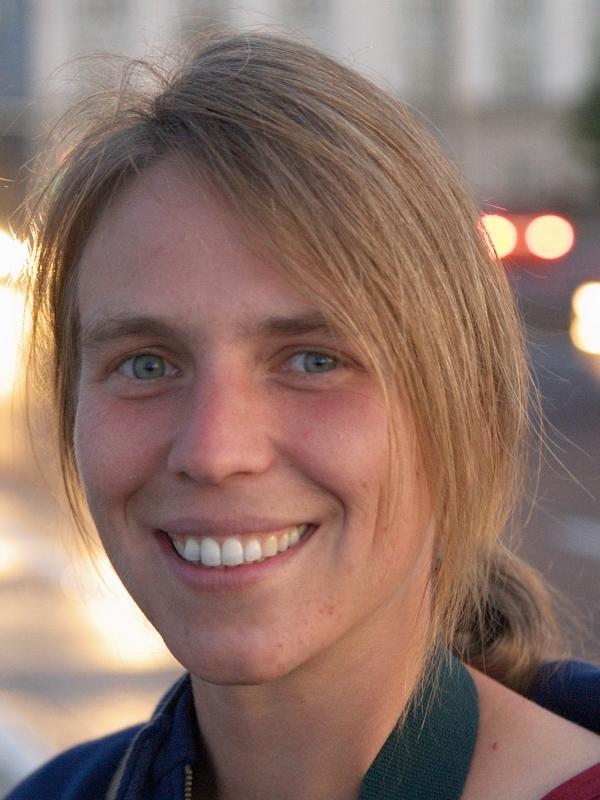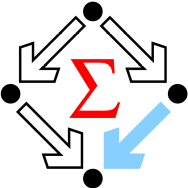Members

Koustav Banerjee

Abilio de Freitas

Nikolai Fadeev

Ralf Hemmecke

Peter Paule: Director 2009-2023

Veronika Pillwein

Cristian-Silviu Radu

Carsten Schneider: Director
Lukas Woegerer

Ongoing Projects
Computer Algebra for Multi-Loop Feynman Integrals
Software
Asymptotics
A Mathematica Package for Computing Asymptotic Series Expansions of Univariate Holonomic Sequences
This package is part of the RISCErgoSum bundle. The Asymptotics package provides a command for computing asymptotic series expansions of solutions of P-finite recurrence equations. ...
Bibasic Telescope
A Mathematica Implementation of a Generalization of Gosper's Algorithm to Bibasic Hypergeometric Summation
This package is part of the RISCErgoSum bundle. pqTelescope is a Mathematica implementation of a generalization of Gosper’s algorithm to indefinite bibasic hypergeometric summation. The package has been developed by Axel Riese, a former member of the RISC Combinatorics group. ...
Dependencies
A Mathematica Package for Computing Algebraic Relations of C-finite Sequences and Multi-Sequences
This package is part of the RISCErgoSum bundle. For any tuple f_1, f_2,..., f_r of sequences, the set of multivariate polynomials p such that p(f1(n),f2(n),...,fr(n))=0 for all points n forms ...
DiffTools
A Mathematica Implementation of several Algorithms for Solving Linear Difference Equations with Polynomial Coefficients
DiffTools is a Mathematica implementation for solving linear difference equations with polynomial coefficients. It contains an algorithm for finding polynomial solutions (by Marko Petkovsek), the algorithm by Sergei Abramov for finding rational solutions, the algorithm of Mark van Hoeij for ...
Paul Kainberger Short description DrawFunDoms.m is a Mathematica package for drawing fundamental domains for congruence subgroups in the modular group SL2(ℤ). It was written by Paul Kainberger as part of his master’s thesis under supervision of Univ.-Prof. Dr. ...
This package is part of the RISCErgoSum bundle. Engel is a Mathematica implementation of the q -Engel Expansion algorithm which expands q-series into inverse polynomial series. Examples of q-Engel Expansions include the Rogers-Ramanujan identities together with their elegant generalization by ...
A Mathematica package based on Sigma that tries to evaluate automatically multi-sums to expressions in terms of indefinite nested sums defined over (q-)hypergeometric products. ...
fastZeil
The Paule/Schorn Implementation of Gosper’s and Zeilberger’s Algorithms
This package is part of the RISCErgoSum bundle. With Gosper’s algorithm you can find closed forms for indefinite hypergeometric sums. If you do not succeed, then you may use Zeilberger’s algorithm to come up with a recurrence relation for that ...
GeneratingFunctions
A Mathematica Package for Manipulations of Univariate Holonomic Functions and Sequences
This package is part of the RISCErgoSum bundle. GeneratingFunctions is a Mathematica package for manipulations of univariate holonomic functions and sequences. ...
GenOmega
A Mathematica Implementation of Guo-Niu Han's General Algorithm for MacMahon's Partition Analysis
This package is part of the RISCErgoSum bundle. GenOmega is a Mathematica implementation of Guo-Niu Han’s general Algorithm for MacMahon’s Partition Analysis carried out by Manuela Wiesinger, a master student of the RISC Combinatorics group. Partition Analysis is a computational ...
Guess
A Mathematica Package for Guessing Multivariate Recurrence Equations
This package is part of the RISCErgoSum bundle. The Guess package provides commands for guessing multivariate recurrence equations, as well as for efficiently guessing minimal order univariate recurrence, differential, or algebraic equations given the initial terms of a sequence or ...
HarmonicSums
A Mathematica Package for dealing with Harmonic Sums, Generalized Harmonic Sums and Cyclotomic Sums and their related Integral Representations
The HarmonicSums package by Jakob Ablinger allows to deal with nested sums such as harmonic sums, S-sums, cyclotomic sums and cyclotmic S-sums as well as iterated integrals such as harmonic polylogarithms, multiple polylogarithms and cyclotomic polylogarithms in an algorithmic fashion. ...
HolonomicFunctions
A Mathematica Package for dealing with Multivariate Holonomic Functions, including Closure Properties, Summation, and Integration
This package is part of the RISCErgoSum bundle. The HolonomicFunctions package allows to deal with multivariate holonomic functions and sequences in an algorithmic fashion. For this purpose the package can compute annihilating ideals and execute closure properties (addition, multiplication, substitutions) ...
math4ti2.m is an interface package, allowing the execution of zsolve of the package 4ti2 from within Mathematica notebooks. The package is written by Ralf Hemmecke and Silviu Radu. Licence This program is free software: you can redistribute it and/or ...
ModularGroup
A Mathematica Package providing Basic Algorithms and Visualization Routines related to the Modular Group, e.g. for Drawing the Tessellation of the Upper Half-Plane
ModularGroup.m is a Mathematica package which has been developed in the course of the diploma thesis Computer Algebra and Analysis: Complex Variables Visualized, carried out at the Research Institute for Symbolic Computation (RISC) of the Johannes Kepler University Linz ...
MultiIntegrate
The MultiIntegrate package allows to compute multi-dimensional integrals over hyperexponential integrands in terms of (generalized) harmonic sums.
The MultiIntegrate package allows to compute multi-dimensional integrals over hyperexponential integrands in terms of (generalized) harmonic sums. This package uses variations and extensions of the multivariate Alkmkvist-Zeilberger algorithm. Registration and Legal Notices The source code for this package is password ...
MultiSum
A Mathematica Package for Proving Hypergeometric Multi-Sum Identities
This package is part of the RISCErgoSum bundle. MultiSum is a Mathematica package for proving hypergeometric multi-sum identities. It uses an efficient generalization of Sister Celine’s technique to find a homogeneous polynomial recurrence relation for the sum. The package has ...
Omega is a Mathematica implementation of MacMahon’s Partition Analysis carried out by Axel Riese, a Postdoc of the RISC Combinatorics group. It has been developed together with George E. Andrews and Peter Paule within the frame of a project initiated ...
ore_algebra
A Sage Package for doing Computations with Ore Operators
The ore_algebra package provides an implementation of Ore algebras for Sage. The main features for the most common instances include basic arithmetic and actions; gcrd and lclm; D-finite closure properties; natural transformations between related algebras; guessing; desingularization; solvers for polynomials, ...
OreSys
A Mathematica Implementation of several Algorithms for Uncoupling Systems of Linear Ore Operator Equations
This package is part of the RISCErgoSum bundle. OreSys is a Mathematica package for uncoupling systems of linear Ore operator equations. It offers four algorithms for reducing systems of differential or (q-)difference equations to higher order equations in a single ...
PermGroup
A Mathematica Package for Permutation Groups, Group Actions and Polya Theory
PermGroup is a Mathematica package dealing with permutation groups, group actions and Polya theory. The package has been developed by Thomas Bayer, a former student of the RISC Combinatorics group. ...
PLDESolver
The PLDESolver package is a Mathematica package to find solutions of parameterized linear difference equations in difference rings.
The PLDESolver package by Jakob Ablinger and Carsten Schneider is a Mathematica package that allows to compute solutions of non-degenerated linear difference operators in difference rings with zero-divisors by reducing it to finding solutions in difference rings that are integral ...
PositiveSequence
A Mathematica package for showing positivity of univariate C-finite and holonomic sequences
This package is part of the RISCErgoSum bundle. See Download and Installation. Short Description The PositiveSequence package provides methods to show positivity of C-finite and holonomic sequences. Accompanying files Demo.nb Hints Type ?PositiveSequence for information. The package is developed ...
The QEta package is a collection of programs written in the FriCAS computer algebra system that allow to compute with Dedekind eta-functions and related q-series where q=exp(2 π i τ). Furthermore, we provide a number of functions connected to the ...
qFunctions
The qFunctions package is a Mathematica package for q-series and partition theory applications.
The qFunctions package by Jakob Ablinger and Ali K. Uncu is a Mathematica package for q-series and partition theory applications. This package includes both experimental and symbolic tools. The experimental set of elements includes guessers for q-shift equations and recurrences ...
qGeneratingFunctions
A Mathematica Package for Manipulations of Univariate q-Holonomic Functions and Sequences
This package is part of the RISCErgoSum bundle. The qGeneratingFunctions package provides commands for manipulating q-holonomic sequences and power series. ...
qMultiSum
A Mathematica Package for Proving q-Hypergeometric Multi-Sum Identities
This package is part of the RISCErgoSum bundle. qMultiSum is a Mathematica package for proving q-hypergeometric multiple summation identities. The package has been developed by Axel Riese, a former member of the RISC Combinatorics group. ...
qZeil
A Mathematica Implementation of q-Analogues of Gosper's and Zeilberger's Algorithm
This package is part of the RISCErgoSum bundle. qZeil is a Mathematica implementation of q-analogues of Gosper’s and Zeilberger’s algorithm for proving and finding indefinite and definite q-hypergeometric summation identities. The package has been developed by Axel Riese, a former ...
RaduRK is a Mathematica implementation of an algorithm developed by Cristian-Silviu Radu. The algorithm takes as input an arithmetic sequence a(n) generated from a large class of q-Pochhammer quotients, together with a given arithmetic progression mn+j, and the level of ...
RatDiff
A Mathematica Implementation of Mark van Hoeij's Algorithm for Finding Rational Solutions of Linear Difference Equations
RatDiff is a Mathematica implementation of Mark van Hoeij's algorithm for finding rational solutions of linear difference equations. The package has been developed by Axel Riese, a Postdoc of the RISC Combinatorics group during a stay at the University of ...
RLangGFun
A Maple Implementation of the Inverse Schützenberger Methodology
The inverse Schützenberger methodology transforms a rational generating function into a (pseudo-) regular expression for a corresponding regular language, and is based on Soittola's Theorem about the N-rationality of a formal power series. It is implemented in the Maple package ...
Sigma
A Mathematica Package for Discovering and Proving Multi-Sum Identities
Sigma is a Mathematica package that can handle multi-sums in terms of indefinite nested sums and products. The summation principles of Sigma are: telescoping, creative telescoping and recurrence solving. The underlying machinery of Sigma is based on difference field theory. ...
Singular.m is an interface package, allowing the execution of Singular functions from Mathematica notebooks, written by Manuel Kauers and Viktor Levandovskyy. ...
Stirling
A Mathematica Package for Computing Recurrence Equations of Sums Involving Stirling Numbers or Eulerian Numbers
This package is part of the RISCErgoSum bundle. The Stirling package provides a command for computing recurrence equations of sums involving Stirling numbers or Eulerian numbers. ...
SumCracker
A Mathematica Implementation of several Algorithms for Identities and Inequalities of Special Sequences, including Summation Problems
This package is part of the RISCErgoSum bundle. The SumCracker package contains routines for manipulating a large class of sequences (admissible sequences). It can prove identities and inequalities for these sequences, simplify expressions, evaluate symbolic sums, and solve certain difference ...
Zeilberger
A Maxima Implementation of Gosper's and Zeilberger's Algorithm
Zeilberger is an implementatian for the free and open source Maxima computer algebra system of Gosper's and Zeilberger's algorithm for proving and finding indefinite and definite hypergeometric summation identities. The package has been developed by Fabrizio Caruso, a former Ph. ...
Publications
2024
The first-order factorizable contributions to the three-loop massive operator matrix elements $A_{Qg}^{(3)}$ and $Delta A_{Qg}^{(3)}$
J. Ablinger, A. Behring, J. Bluemlein, A. De Freitas, A. von Manteuffel, C. Schneider, K. Schoenwald
Nuclear Physics B 999(116427), pp. 1-42. 2024. ISSN 0550-3213. arXiv:2311.00644 [hep-ph]. [doi]author = {J. Ablinger and A. Behring and J. Bluemlein and A. De Freitas and A. von Manteuffel and C. Schneider and K. Schoenwald},
title = {{The first--order factorizable contributions to the three--loop massive operator matrix elements $A_{Qg}^{(3)}$ and $Delta A_{Qg}^{(3)}$}},
language = {english},
abstract = {The unpolarized and polarized massive operator matrix elements $A_{Qg}^{(3)}$ and $Delta A_{Qg}^{(3)}$contain first--order factorizable and non--first--order factorizable contributions in the determining difference or differential equations of their master integrals. We compute their first--order factorizable contributions in the single heavy mass case for all contributing Feynman diagrams. Moreover, we present the complete color--$zeta$ factors for the cases in which also non--first--order factorizable contributions emerge in the master integrals, but cancel in the final result as found by using the method of arbitrary high Mellin moments. Individual contributions depend also on generalized harmonic sums and on nested finite binomial and inverse binomial sums in Mellin $N$--space, and correspondingly, on Kummer--Poincar'e and square--root valued alphabets in Bjorken--$x$ space. We present a complete discussion of the possibilities of solving the present problem in $N$--space analytically and we also discuss the limitations in the present case to analytically continue the given $N$--space expressions to $N in mathbb{C}$ by strict methods. The representation through generating functions allows a well synchronized representation of the first--order factorizable results over a 17--letter alphabet. We finally obtain representations in terms of iterated integrals over the corresponding alphabet in $x$--space, also containing up to weight {sf w = 5} special constants, which can be rationalized to Kummer--Poincar'e iterated integrals at special arguments. The analytic $x$--space representation requires separate analyses for the intervals $x in [0,1/4], [1/4,1/2], [1/2,1]$ and $x > 1$. We also derive the small and large $x$ limits of the first--order factorizable contributions. Furthermore, we perform comparisons to a number of known Mellin moments, calculated by a different method for the corresponding subset of Feynman diagrams, and an independent high--precision numerical solution of the problems.},
journal = {Nuclear Physics B},
volume = {999},
number = {116427},
pages = {1--42},
isbn_issn = {ISSN 0550-3213},
year = {2024},
note = {arXiv:2311.00644 [hep-ph]},
refereed = {yes},
keywords = {Feynman diagram, massive operator matrix elements, computer algebra, differential equations, difference equations, coupled systems, nested integrals, nested sums},
length = {42},
url = {https://doi.org/10.1016/j.nuclphysb.2023.116427}
}
The non-first-order-factorizable contributions to the three-loop single-mass operator matrix elements $A_{Qg}^{(3)}$ and $Delta A_{Qg}^{(3)}$
J. Ablinger, A. Behring, J. Bluemlein, A. De Freitas, A. von Manteuffel, C. Schneider, K. Schoenwald
Technical report no. 24-02 in RISC Report Series, Research Institute for Symbolic Computation (RISC), Johannes Kepler University Linz, Austria. ISSN 2791-4267 (online). March 2024. arXiv:2403.00513 [[hep-ph]. Licensed under CC BY 4.0 International. [doi] [pdf]author = {J. Ablinger and A. Behring and J. Bluemlein and A. De Freitas and A. von Manteuffel and C. Schneider and K. Schoenwald},
title = {{The non-first-order-factorizable contributions to the three-loop single-mass operator matrix elements $A_{Qg}^{(3)}$ and $Delta A_{Qg}^{(3)}$}},
language = {english},
abstract = {The non-first-order-factorizable contributions to the unpolarized and polarized massive operator matrix elements to three-loop order, $A_{Qg}^{(3)}$ and $Delta A_{Qg}^{(3)}$, are calculated in the single-mass case. For the $_2F_1$-related master integrals of the problem, we use a semi-analytic method basedon series expansions and utilize the first-order differential equations for the master integrals whichdoes not need a special basis of the master integrals. Due to the singularity structure of this basis a part of the integrals has to be computed to $O(ep^5)$ in the dimensional parameter. The solutions have to be matched at a series of thresholds and pseudo-thresholds in the region of the Bjorken variable $x in ]0,infty[$ using highly precise series expansions to obtain the imaginary part of the physical amplitude for $x in ]0,1]$ at a high relative accuracy. We compare the present results both with previous analytic results, the results for fixed Mellin moments, and a prediction in the small-$x$ region. We also derive expansions in the region of small and large values of $x$. With this paper, all three-loop single-mass unpolarized and polarized operator matrix elements are calculated.},
number = {24-02},
year = {2024},
month = {March},
note = {arXiv:2403.00513 [[hep-ph]},
keywords = {Feynman diagram, massive operator matrix elements, computer algebra, differential equations, difference equations, coupled systems, numerics},
length = {14},
license = {CC BY 4.0 International},
type = {RISC Report Series},
institution = {Research Institute for Symbolic Computation (RISC), Johannes Kepler University Linz},
address = {Altenberger Straße 69, 4040 Linz, Austria},
issn = {2791-4267 (online)}
}
A tree-based algorithm for the integration of monomials in the Chow ring of the moduli space of stable marked curves of genus zero
Jiayue Qi
Journal of Symbolic Computation 122(102253), pp. -. 2024. ISSN: 0747-7171. [doi]author = {Jiayue Qi},
title = {{A tree-based algorithm for the integration of monomials in the Chow ring of the moduli space of stable marked curves of genus zero}},
language = {english},
journal = {Journal of Symbolic Computation},
volume = {122},
number = {102253},
pages = {--},
isbn_issn = {ISSN: 0747-7171},
year = {2024},
refereed = {yes},
length = {52},
url = {https://doi.org/10.1016/j.jsc.2023.102253}
}
Representation of hypergeometric products of higher nesting depths in difference rings
E.D. Ocansey, C. Schneider
J. Symb. Comput. 120, pp. 1-50. 2024. ISSN: 0747-7171. arXiv:2011.08775 [cs.SC]. [doi]author = {E.D. Ocansey and C. Schneider},
title = {{Representation of hypergeometric products of higher nesting depths in difference rings}},
language = {english},
journal = {J. Symb. Comput.},
volume = {120},
pages = {1--50},
isbn_issn = {ISSN: 0747-7171},
year = {2024},
note = {arXiv:2011.08775 [cs.SC]},
refereed = {yes},
length = {50},
url = {https://doi.org/10.1016/j.jsc.2023.03.002}
}
Creative Telescoping for Hypergeometric Double Sums
P. Paule, C. Schneider
Technical report no. 24-01 in RISC Report Series, Research Institute for Symbolic Computation (RISC), Johannes Kepler University Linz, Austria. ISSN 2791-4267 (online). January 2024. arXiv:2401.16314 [cs.SC]. Licensed under CC BY 4.0 International. [doi] [pdf]author = {P. Paule and C. Schneider},
title = {{Creative Telescoping for Hypergeometric Double Sums}},
language = {english},
abstract = {We present efficient methods for calculating linear recurrences of hypergeometric double sums and, more generally, of multiple sums. In particular, we supplement this approach with the algorithmic theory of contiguous relations, which guarantees the applicability of our method for many input sums. In addition, we elaborate new techniques to optimize the underlying key task of our method to compute rational solutions of parameterized linear recurrences.},
number = {24-01},
year = {2024},
month = {January},
note = {arXiv:2401.16314 [cs.SC]},
keywords = {creative telescoping; symbolic summation, hypergeometric multi-sums, contiguous relations, parameterized recurrences, rational solutions},
length = {26},
license = {CC BY 4.0 International},
type = {RISC Report Series},
institution = {Research Institute for Symbolic Computation (RISC), Johannes Kepler University Linz},
address = {Altenberger Straße 69, 4040 Linz, Austria},
issn = {2791-4267 (online)}
}
2023
Positivity of the second shifted difference of partitions and overpartitions: a combinatorial approach
Koustav Banerjee
Enumerative Combinatorics and Applications 3, pp. 1-4. 2023. ISSN 2710-2335. [doi]author = {Koustav Banerjee},
title = {{Positivity of the second shifted difference of partitions and overpartitions: a combinatorial approach}},
language = {english},
journal = {Enumerative Combinatorics and Applications},
volume = {3},
pages = {1--4},
isbn_issn = {ISSN 2710-2335},
year = {2023},
refereed = {yes},
length = {5},
url = {https://doi.org/10.54550/ECA2023V3S2R12}
}
Inequalities for the modified Bessel function of first kind of non-negative order
K. Banerjee
Journal of Mathematical Analysis and Applications 524, pp. 1-28. 2023. Elsevier, ISSN 1096-0813. [doi]author = {K. Banerjee},
title = {{Inequalities for the modified Bessel function of first kind of non-negative order}},
language = {english},
journal = {Journal of Mathematical Analysis and Applications},
volume = {524},
pages = {1--28},
publisher = {Elsevier},
isbn_issn = {ISSN 1096-0813},
year = {2023},
refereed = {yes},
length = {28},
url = {https://doi.org/10.1016/j.jmaa.2023.127082}
}
2-Elongated Plane Partitions and Powers of 7: The Localization Method Applied to a Genus 1 Congruence Family
K. Banerjee, N.A. Smoot
Technical report no. 23-10 in RISC Report Series, Research Institute for Symbolic Computation (RISC), Johannes Kepler University Linz, Austria. ISSN 2791-4267 (online). August 2023. Licensed under CC BY 4.0 International. [doi] [pdf]author = {K. Banerjee and N.A. Smoot},
title = {{2-Elongated Plane Partitions and Powers of 7: The Localization Method Applied to a Genus 1 Congruence Family}},
language = {english},
abstract = {Over the last century, a large variety of infinite congruence families have been discovered and studied, exhibiting a great variety with respect to their difficulty. Major complicating factors arise from the topology of the associated modular curve: classical techniques are sufficient when the associated curve has cusp count 2 and genus 0. Recent work has led to new techniques that have proven useful when the associated curve has cusp count greater than 2 and genus 0. We show here that these techniques may be adapted in the case of positive genus. In particular, we examine a congruence family over the 2-elongated plane partition diamond counting function $d_2(n)$ by powers of 7, for which the associated modular curve has cusp count 4 and genus 1. We compare our method with other techniques for proving genus 1 congruence families, and present a second congruence family by powers of 7 which we conjecture, and which may be amenable to similar techniques.},
number = {23-10},
year = {2023},
month = {August},
keywords = {Partition congruences, infinite congruence family, modular functions, plane partitions, partition analysis, modular curve, Riemann surface},
length = {35},
license = {CC BY 4.0 International},
type = {RISC Report Series},
institution = {Research Institute for Symbolic Computation (RISC), Johannes Kepler University Linz},
address = {Altenberger Straße 69, 4040 Linz, Austria},
issn = {2791-4267 (online)}
}
Analytic results on the massive three-loop form factors: quarkonic contributions
J. Bluemlein, A. De Freitas, P. Marquard, N. Rana, C. Schneider
Physical Review D 108(094003), pp. 1-73. 2023. ISSN 2470-0029. arXiv:2307.02983 [hep-ph]. [doi]author = {J. Bluemlein and A. De Freitas and P. Marquard and N. Rana and C. Schneider},
title = {{Analytic results on the massive three-loop form factors: quarkonic contributions}},
language = {english},
abstract = {The quarkonic contributions to the three--loop heavy-quark form factors for vector, axial-vector, scalar and pseudoscalar currents are described by closed form difference equations for the expansion coefficients in the limit of small virtualities $q^2/m^2$. A part of the contributions can be solved analytically and expressed in terms of harmonic and cyclotomic harmonic polylogarithms and square-root valued iterated integrals. Other contributions obey equations which are not first--order factorizable. For them still infinite series expansions around the singularities of the form factors can be obtained by matching the expansions at intermediate points and using differential equations which are obeyed directly by the form factors and are derived by guessing algorithms. One may determine all expansion coefficients for $q^2/m^2 rightarrow infty$ analytically in terms of multiple zeta values. By expanding around the threshold and pseudo--threshold, the corresponding constants are multiple zeta values supplemented by a finite amount of new constants, which can be computed at high precision. For a part of these coefficients, the infinite series in front of these constants may be even resummed into harmonic polylogarithms. In this way, one obtains a deeper analytic description of the massive form factors, beyond their pure numerical evaluation. The calculations of these analytic results are based on sophisticated computer algebra techniques. We also compare our results with numerical results in the literature.},
journal = {Physical Review D},
volume = {108},
number = {094003},
pages = {1--73},
isbn_issn = {ISSN 2470-0029},
year = {2023},
note = {arXiv:2307.02983 [hep-ph]},
refereed = {yes},
keywords = {form factor, Feynman diagram, computer algebra, holonomic properties, difference equations, differential equations, symbolic summation, numerical matching, analytic continuation, guessing, PSLQ},
length = {92},
url = {https://www.doi.org/10.1103/PhysRevD.108.094003}
}
Recent 3-Loop Heavy Flavor Corrections to Deep-Inelastic Scattering
J. Ablinger, A. Behring, J. Bluemlein, A. De Freitas, A. Goedicke, A. von Manteuffel, C. Schneider, K. Schoenwald
In: Proc. of the 16th International Symposium on Radiative Corrections: Applications of Quantum Field Theory to Phenomenology , Giulio Falcioni (ed.), PoS RADCOR2023046, pp. 1-7. June 2023. ISSN 1824-8039. arXiv:2306.16550 [hep-ph]. [doi]author = {J. Ablinger and A. Behring and J. Bluemlein and A. De Freitas and A. Goedicke and A. von Manteuffel and C. Schneider and K. Schoenwald},
title = {{Recent 3-Loop Heavy Flavor Corrections to Deep-Inelastic Scattering}},
booktitle = {{Proc. of the 16th International Symposium on Radiative Corrections: Applications of Quantum Field Theory to Phenomenology }},
language = {english},
abstract = {We report on recent progress in calculating the three loop QCD corrections of the heavy flavor contributions in deep--inelastic scattering and the massive operator matrix elements of the variable flavor number scheme. Notably we deal with the operator matrix elements $A_{gg,Q}^{(3)}$ and $A_{Qg}^{(3)}$ and technical steps to their calculation. In particular, a new method to obtain the inverse Mellin transform without computing the corresponding $N$--space expressions is discussed.},
series = {PoS},
volume = {RADCOR2023},
number = {046},
pages = {1--7},
isbn_issn = {ISSN 1824-8039},
year = {2023},
month = {June},
note = {arXiv:2306.16550 [hep-ph]},
editor = {Giulio Falcioni},
refereed = {no},
keywords = {deep-inelastic scattering, 3-loop Feynman diagrams, (inverse) Mellin transform, binomial sums},
length = {7},
url = { https://doi.org/10.22323/1.432.0046 }
}
An extension of holonomic sequences: $C^2$-finite sequences
A. Jimenez-Pastor, P. Nuspl, V. Pillwein
Journal of Symbolic Computation 116, pp. 400-424. 2023. ISSN: 0747-7171.author = {A. Jimenez-Pastor and P. Nuspl and V. Pillwein},
title = {{An extension of holonomic sequences: $C^2$-finite sequences}},
language = {english},
journal = {Journal of Symbolic Computation},
volume = {116},
pages = {400--424},
isbn_issn = {ISSN: 0747-7171},
year = {2023},
refereed = {yes},
length = {25}
}
Order bounds for $C^2$-finite sequences
M. Kauers, P. Nuspl, V. Pillwein
In: Proceedings of the 2023 International Symposium on Symbolic and Algebraic Computation, A.Dickenstein, E. Tsigaridas and G. Jeronimo (ed.), ISSAC '23, Tromso{}, Norway , pp. 389-397. July 2023. Association for Computing Machinery, New York, NY, USA, 9798400700392}. [doi]author = {M. Kauers and P. Nuspl and V. Pillwein},
title = {{Order bounds for $C^2$-finite sequences}},
booktitle = {{Proceedings of the 2023 International Symposium on Symbolic and Algebraic Computation}},
language = {english},
abstract = {A sequence is called $C$-finite if it satisfies a linear recurrence with constant coefficients. We study sequences which satisfy a linear recurrence with $C$-finite coefficients. Recently, it was shown that such $C^2$-finite sequences satisfy similar closure properties as $C$-finite sequences. In particular, they form a difference ring. In this paper we present new techniques for performing these closure properties of $C^2$-finite sequences. These methods also allow us to derive order bounds which were not known before. Additionally, they provide more insight in the effectiveness of these computations. The results are based on the exponent lattice of algebraic numbers. We present an iterative algorithm which can be used to compute bases of such lattices.},
series = {ISSAC '23, Tromso{}, Norway},
pages = {389--397},
publisher = {Association for Computing Machinery},
address = {New York, NY, USA},
isbn_issn = {9798400700392}},
year = {2023},
month = {July},
editor = {A.Dickenstein and E. Tsigaridas and G. Jeronimo},
refereed = {no},
keywords = {Difference equations, holonomic sequences, closure properties, algorithms},
length = {9},
url = {https://doi.org/10.35011/risc.23-03}
}
Algorithms for linear recurrence sequences
P. Nuspl
Johannes Kepler University Linz. PhD Thesis. 2023. [pdf]author = {P. Nuspl},
title = {{Algorithms for linear recurrence sequences}},
language = {english},
year = {2023},
translation = {0},
school = {Johannes Kepler University Linz},
length = {129}
}
Ramanujan and Computer Algebra
Peter Paule
In: Srinivasa Ramanujan: His Life, Legacy, and Mathematical Influence, K. Alladi, G.E. Andrews, B. Berndt, F. Garvan, K. Ono, P. Paule, S. Ole Warnaar, Ae Ja Yee (ed.), pp. -. 2023. Springer, ISBN x. [pdf]author = {Peter Paule},
title = {{Ramanujan and Computer Algebra}},
booktitle = {{Srinivasa Ramanujan: His Life, Legacy, and Mathematical Influence}},
language = {english},
pages = {--},
publisher = {Springer},
isbn_issn = {ISBN x},
year = {2023},
editor = {K. Alladi and G.E. Andrews and B. Berndt and F. Garvan and K. Ono and P. Paule and S. Ole Warnaar and Ae Ja Yee },
refereed = {yes},
length = {0}
}
Interview with Peter Paule
Toufik Mansour and Peter Paule
Enumerative Combinatorics and Applications ECA 3:1(#S3I1), pp. -. 2023. ISSN 2710-2335. [doi]author = {Toufik Mansour and Peter Paule},
title = {{Interview with Peter Paule}},
language = {english},
journal = {Enumerative Combinatorics and Applications },
volume = {ECA 3:1},
number = {#S3I1},
pages = {--},
isbn_issn = {ISSN 2710-2335},
year = {2023},
refereed = {yes},
length = {0},
url = {http://doi.org/10.54550/ECA2023V3S1I1}
}
MacMahon's Partition Analysis XV: Parity
G.E. Andrews and P. Paule
Technical report no. 23-14 in RISC Report Series, Research Institute for Symbolic Computation (RISC), Johannes Kepler University Linz, Austria. ISSN 2791-4267 (online). December 2023. Licensed under CC BY 4.0 International. [doi] [pdf]author = {G.E. Andrews and P. Paule},
title = {{MacMahon's Partition Analysis XV: Parity}},
language = {english},
abstract = {We apply the methods of partition analysis to partitions in which the parity of parts plays a role. We begin with an in-depth treatment of the generating function for the partitions from the first G ̈ollnitz-Gordon identity. We then deduce a Schmidt-type theorem related to the false theta functions. We also consider: (1) position parity, (2) partitions with distinct even parts, (3) partitions with distinct odd parts. One of the corollaries of these last considerations is a new interpretation of Hei-Chi Chan’s cubic partitions. A second part of our article is devoted to the algorithmic derivation of identities and arithmetic congruences related to the generating functions considered in part one, including cubic partitions. To this end, Smoot’s implementation of Radu’s Ramanujan-Kolberg algorithm is used. Finally, we give a short description which explains how to use the Omega package to derive special instances of the results of part one.},
number = {23-14},
year = {2023},
month = {December},
keywords = {G ̈ollnitz-Gordon partitions, Schmidt-type identities, parity of parts, MacMahon’s partition analysis, q-series, partition congruences, Radu’s Ramanujan-Kolberg algorithm, the Omega package},
length = {31},
license = {CC BY 4.0 International},
type = {RISC Report Series},
institution = {Research Institute for Symbolic Computation (RISC), Johannes Kepler University Linz},
address = {Altenberger Straße 69, 4040 Linz, Austria},
issn = {2791-4267 (online)}
}
MacMahon's Partition Analysis XIV: Partitions with n copies of n
G.E. Andrews, P. Paule
To appear in: Journal of Combinatorial Theory, Series A(22-14), pp. -. 2023. ???. [doi]author = {G.E. Andrews and P. Paule},
title = {{MacMahon's Partition Analysis XIV: Partitions with n copies of n}},
language = {english},
abstract = {We apply the methods of partition analysis to partitions with~$n$ copies of~$n$. This allows us to obtain multivariable generatingfunctions related to classical Rogers-Ramanujan type identities. Also, partitionswith $n$ copies of $n$ are extended to partition diamonds yielding numerous new results including a natural connection to overpartitions and a variety of partitioncongruences.},
journal = {To appear in: Journal of Combinatorial Theory, Series A},
number = {22-14},
pages = {--},
isbn_issn = {???},
year = {2023},
refereed = {yes},
keywords = {partitions, overpartitions, partitions with $n$ copies of $n$, partition analysis, $q$-series, modular forms and partition congruences, Radu's Ramanujan-Kolberg algorithm},
sponsor = {FWF},
length = {30},
url = {https://doi.org/10.35011/risc.22-14},
type = {Research Article}
}
Recursion Formulas for Integrated Products of Jacobi Polynomials
S. Beuchler, T. Haubold, V. Pillwein
Constructive Approximation, pp. 0-0. 2023. 1432-0940. https://arxiv.org/abs/2105.08989. [doi]author = {S. Beuchler and T. Haubold and V. Pillwein},
title = {{Recursion Formulas for Integrated Products of Jacobi Polynomials}},
language = {english},
abstract = {From the literature it is known that orthogonal polynomials as the Jacobi polynomials can be expressed by hypergeometric series. In this paper, the authors derive several contiguous relations for terminating multivariate hypergeometric series. With these contiguous relations one can prove several recursion formulas of those series. This theoretical result allows to compute integrals over products of Jacobi polynomials in a very efficient recursive way. Moreover, the authors present an application to numerical analysis where it can be used in algorithms which compute the approximate solution of boundary value problem of partial differential equations by means of the finite elements method. With the aid of the contiguous relations, the approximate solution can be computed much faster than using numerical integration. A numerical example illustrates this effect.},
journal = {Constructive Approximation},
pages = {0--0},
isbn_issn = {1432-0940},
year = {2023},
note = {https://arxiv.org/abs/2105.08989},
refereed = {yes},
length = {0},
url = {https://doi.org/10.1007/s00365-023-09655-z}
}
Five Equivalent Representations of a Phylogenetic Tree
Jiayue Qi, Josef Schicho
Maple Transactions 3(3), pp. -. 2023. (ISSN) 2564-3029. [doi]author = {Jiayue Qi and Josef Schicho},
title = {{Five Equivalent Representations of a Phylogenetic Tree}},
language = {english},
journal = {Maple Transactions},
volume = {3},
number = {3},
pages = {--},
isbn_issn = {(ISSN) 2564-3029},
year = {2023},
refereed = {yes},
length = {15},
url = {https://doi.org/10.5206/mt.v3i3.16464}
}
On the Chow ring of (the) moduli space of stable marked curves of genus zero
Jiayue Qi
Research Institute for Symbolic Computation, Johannes Kepler University Linz. PhD Thesis. 2023.author = {Jiayue Qi},
title = {{On the Chow ring of (the) moduli space of stable marked curves of genus zero}},
language = {English},
year = {2023},
translation = {0},
school = {Research Institute for Symbolic Computation, Johannes Kepler University Linz},
length = {127}
}




